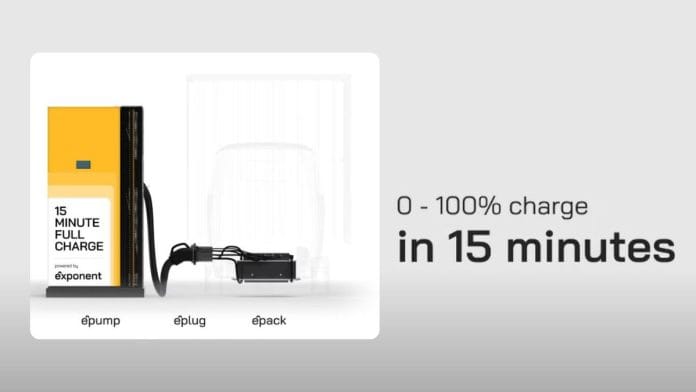New Delhi: While the world was fawning over the latest innovation—5-minute charging for electric vehicles (EVs)—by China’s BYD last week, a Bengaluru-based Indian company quietly showed that they too have indigenously developed rapid charging technology for electric buses.
Exponent Energy, an EV charging and energy company in India, unveiled its 1 megawatt (MW) indigenous charging technology for electric buses on 19 March, a day after BYD showcased the Super e-Platform, which allows for a charging speed of 1MW for electric cars.
While BYD’s product allows for their new range of electric cars to be fully charged in just 5 minutes, a “game-changer” in EV technology, Exponent isn’t too far behind.
Its new 1MW technology can charge e-buses fitted with its batteries within 15 minutes, the company said in an advertisement posted to their social media on 19 March.
1MW charging
15-minute rapid charging on a BUS
Designed, engineered, and built in India ??
PS: 1.5MW charging coming soon ⚡️ pic.twitter.com/idk1nRQ0s5
— Exponent Energy (@ExponentEnergy) March 19, 2025
“As a nation, we need to have self-belief that we can build and own all layers of EV tech. We’ve historically been followers in ICE. We can’t repeat that with EVs,” said Arun Vinayak, co-founder of Exponent in a statement to the media on 21 March.
1MW charging infrastructure means that both the battery and the charger are capable of channeling a peak 1,000 kilowatt (kW) of electricity, a massive jump up from the existing peak of 400-500 kW.
These restrictions exist because fast charging takes a lot of energy and generates a lot of heat, thus restricting the amount of power that an EV can consume at one point.
However, with BYD’s new technology, experts say that EV charging is now “at the same level as refueling a car”.
Exponent Energy, on the other hand, has also promised to launch its 1.5 MW charging technology in the next few months.
Also Read: India’s shift to EV is making China richer. Over $7 bn paid in 5 years
BYD and Exponent—how did they manage 1MW?
Unlike BYD, an electric car manufacturer, Exponent is a purely energy-focused company. They make everything in the charging infrastructure from battery packs to charging pumps and cables. This is why there’s a difference in the way two companies have been able to develop 1MW charging.
The biggest challenge with this kind of rapid charging is the extreme heat generated in the process.
For BYD, the heat management system is inbuilt across the entire EV ecosystem since it manufactures everything from the cells and batteries to the EVs. The entire production line, including the motors that are fitted into the EVs, have been modified to accommodate the cooling systems necessary to achieve fast charging, without increasing the weight of the vehicle by too much.
On the other hand, Exponent Energy, which doesn’t produce battery cells or assemble its own EVs, has packed its entire technology in the battery pack and charger, with the cooling infrastructure hosted in the charging pump.
However, this does mean that only EVs fitted with an Exponent battery pack that are charged at its charging pump can benefit from rapid charging.
Also, Exponent Energy’s special battery packs are only fitted into electric three-wheelers and buses in collaboration with vehicle manufacturers, and they have also installed over 100 charging stations across the country. They have no current plans to venture into 4-wheelers space.
BYD, on the other hand, has developed unique silicon carbide power chips that will be used in its future EVs, thus enabling 1MW charging across its products.
But CEO Vinayak does not see it as a drawback that Exponent Energy doesn’t develop cell or cell infrastructure.
“BYD has excellent cell science capability which is why they can innovate with cells and get 1MW charging. But we were able to do it using normal LFP cells, which makes our products more accessible,” said Vinayak in a press statement.
Right now however, BYD is facing a problem that is similar to Exponent, the need to increase charging stations. It is planning to set up 3,000-4,000 charging stations across China to accommodate their new cars that have the capacity to handle 1MW charging in the new cars.
Exponent, too, is working on increasing its charging infrastructure along the Bengaluru-Hyderabad highway, where the first 1MW charging electric bus will be debuted commercially in the next 6 months.
(Edited by Sanya Mathur)
Also Read: Economic survey outlines how Chinese dependence may impact India’s energy transition & EV incentives






